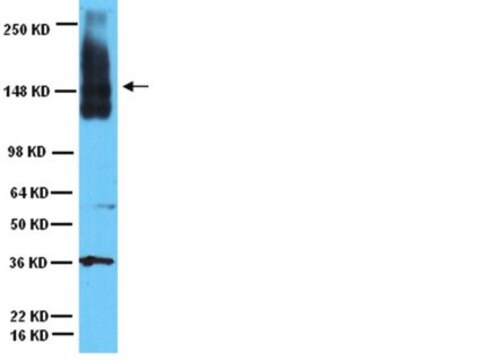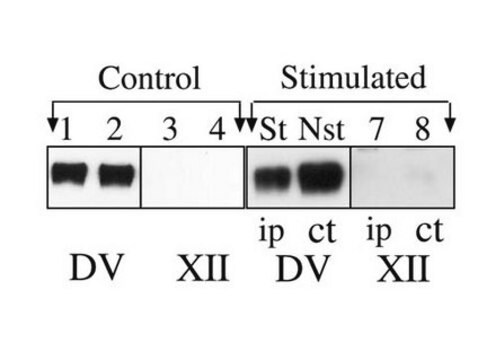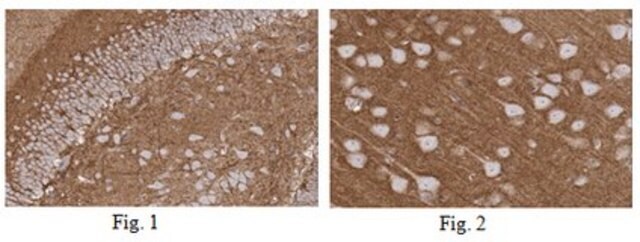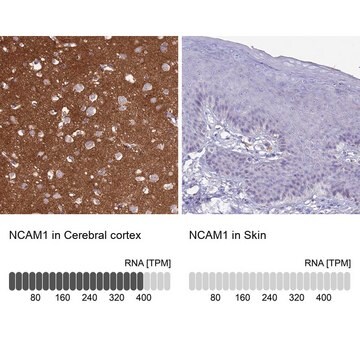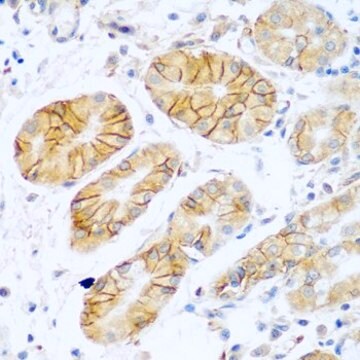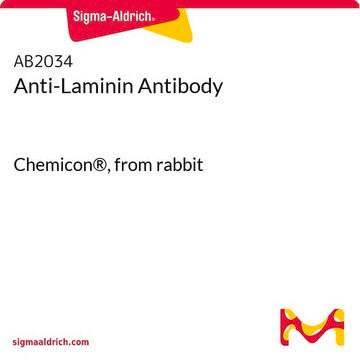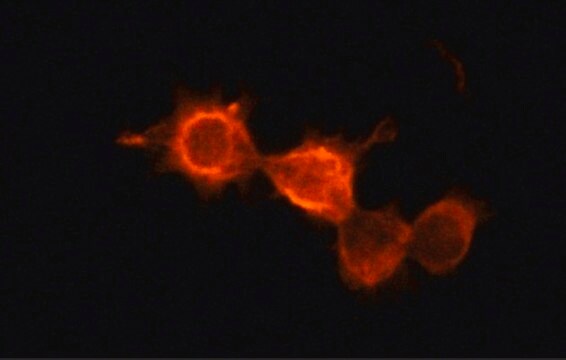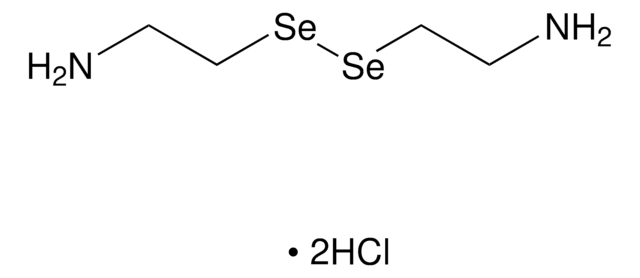추천 제품
생물학적 소스
mouse
Quality Level
결합
unconjugated
항체 형태
ascites fluid
항체 생산 유형
primary antibodies
클론
NCAM-0B11, monoclonal
분자량
antigen 140-180 kDa
포함
15 mM sodium azide
종 반응성
rat, human
기술
immunocytochemistry: suitable using cells and tissues
western blot: 1:100 using a freshly prepared extract from newborn and adult rat brain, or rat cerebral cortex extract
동형
IgG1
배송 상태
dry ice
저장 온도
−20°C
타겟 번역 후 변형
unmodified
유전자 정보
human ... NCAM1(4684) , NCAM2(4685)
rat ... Ncam1(24586) , Ncam2(288280)
일반 설명
Monoclonal Anti-N-CAM (mouse IgG1 isotype) is derived from the hybridoma produced by the fusion of mouse myeloma cells and splenocytes from an immunized mouse. Neural cell adhesion molecule (N-CAM), the best characterized CAM, exists in adult brain. It belongs to the family of sialoglycoproteins, which arise from alternative splicing of mRNA transcribed from a single gene. Immunocytochemical data indicate that in the adult, N-CAM is expressed mainly in cells of the nervous system. There are indications that N-CAM may also be expressed by non-neural cells in the adult, as it has been found in studies of various embryonic developmental stages.
Mouse monoclonal clone NCAM-0B11 anti-Neural Cell Adhesion Molecule antibody localizes the high molecular weight isoform of N-CAM (neural cell adhesion molecule) in human and several other mammalian species. The antibody shows a strong reaction to N-CAM A/N-CAM 180, however it also recognizes N-CAM B/N-CAM 140. In an immunoblot, the product reacts with polysialated N-CAM in embryonic material. Breakdown products of N-CAM may be stained; they appear as bands lower than 100 kD on the immunoblot.
면역원
growth cone enriched plasma membrane fraction from E17 rat forebrain.
애플리케이션
Applications in which this antibody has been used successfully, and the associated peer-reviewed papers, are given below.
Immunofluorescence (1 paper)
Immunohistochemistry (3 papers)
Immunofluorescence (1 paper)
Immunohistochemistry (3 papers)
Monoclonal Anti-Neural Cell Adhesion Molecule antibody produced in mouse has been used in:
- Immunofluorescence
- Immunohistochemistry
- Immunoblotting
생화학적/생리학적 작용
Neural cell adhesion molecule (N-CAM) are believed to be involved in cell-cell interactions and probably play an important role in embryogenesis and development.
면책조항
Unless otherwise stated in our catalog or other company documentation accompanying the product(s), our products are intended for research use only and are not to be used for any other purpose, which includes but is not limited to, unauthorized commercial uses, in vitro diagnostic uses, ex vivo or in vivo therapeutic uses or any type of consumption or application to humans or animals.
적합한 제품을 찾을 수 없으신가요?
당사의 제품 선택기 도구.을(를) 시도해 보세요.
Storage Class Code
10 - Combustible liquids
WGK
nwg
Flash Point (°F)
Not applicable
Flash Point (°C)
Not applicable
Neural cell adhesion molecule (NCAM) isoform expression is associated with neuroblastoma differentiation status
Winter C, et al.
Pediatric Blood & Cancer, 51(1), 10-16 (2008)
Neural cell adhesion molecule expression on renal interstitial cells
Markovic-Lipkovski J, et al.
Nephrology, Dialysis, and Transplantation, 22(6), 1558-1566 (2007)
Fritz W Lischka et al.
The Journal of comparative neurology, 511(3), 360-372 (2008-09-23)
The mucopolysaccharidoses (MPS) are a family of lysosomal storage diseases resulting in developmental defects and, in some types, mental retardation and other neurological symptoms. To gain insight into the neurological dysfunction in MPS, we examined the morphology of olfactory epithelia
J M Neill et al.
Experimental eye research, 51(5), 573-583 (1990-11-01)
Invagination of the optic vesicle to form the optic cup results in the formation of two apposed layers of neuroepithelium which follow divergent developmental pathways. Changes in the expression of cell surface molecules may be either the cause or result
Hong Wang et al.
The Journal of neuroscience : the official journal of the Society for Neuroscience, 27(40), 10703-10713 (2007-10-05)
Patients with viral and bacterial infections or other inflammatory illnesses often experience taste dysfunctions. The agents responsible for these taste disorders are thought to be related to infection-induced inflammation, but the mechanisms are not known. As a first step in
자사의 과학자팀은 생명 과학, 재료 과학, 화학 합성, 크로마토그래피, 분석 및 기타 많은 영역을 포함한 모든 과학 분야에 경험이 있습니다..
고객지원팀으로 연락바랍니다.